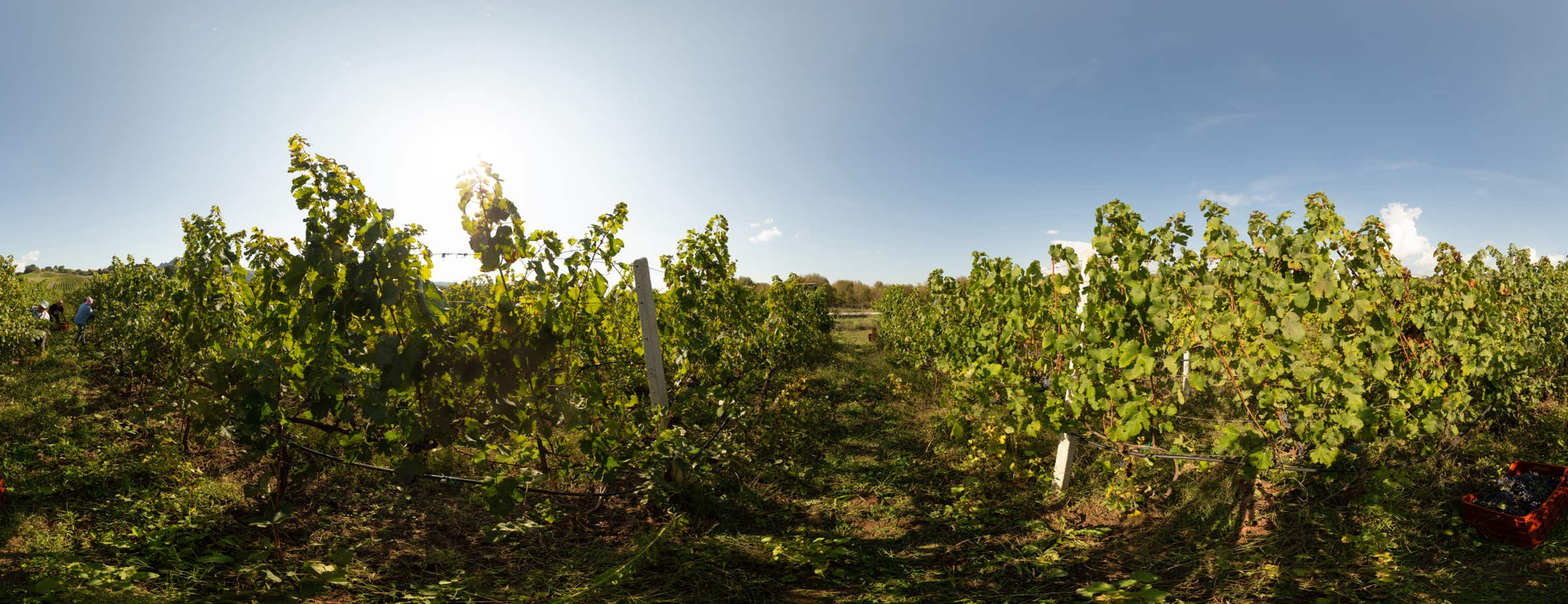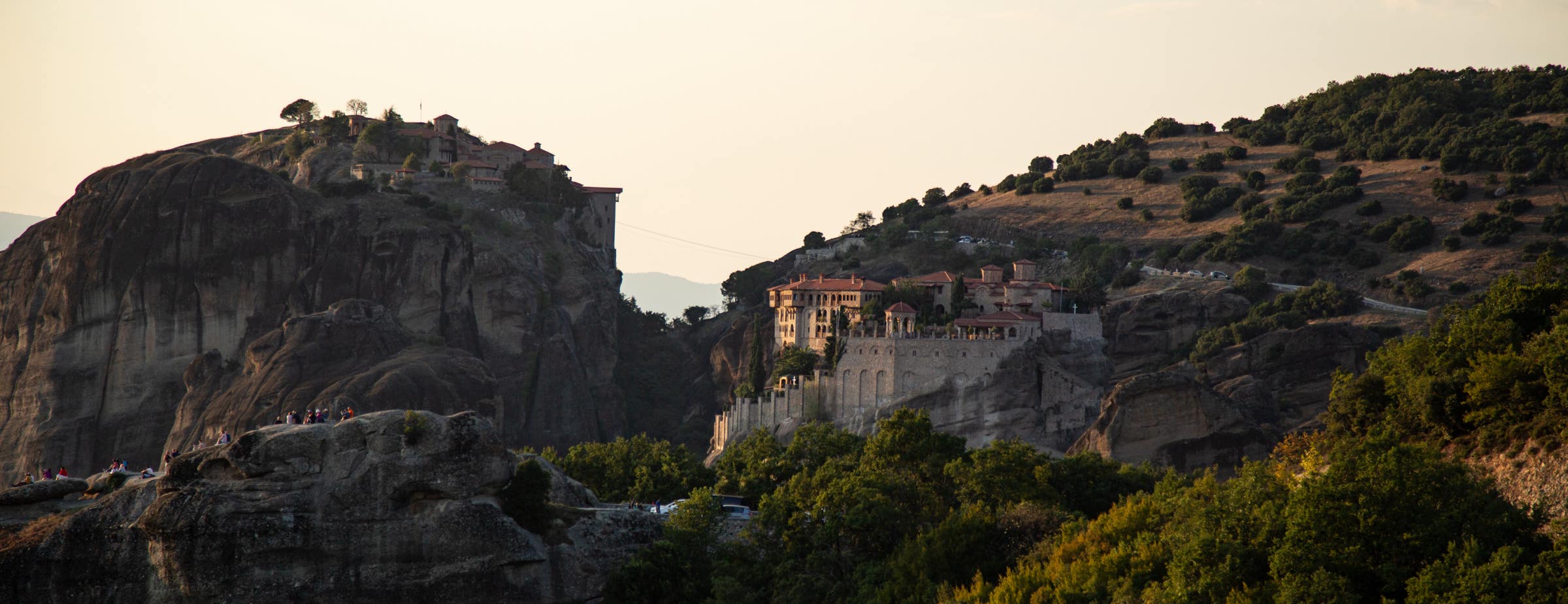Please click on the picture above to start the 360° panoramic tour. The tour consists of multiple locations. To navigate between locations, you can click the arrows pointing to the next location. At each location, you can change the viewpoint by either using the below buttons or click-and-drag. On the right hand-side, an information bar is available for each location giving general information and optional further details on specific shown elements.

The winery is located North of Meteora in Kalampaka, Greece. The Greek word Meteora means "suspended in the air" and this phrase aptly describes the remarkable Greek Orthodox monasteries located there.
Winery
4-5 hours
Spring and autumn are often considered ideal seasons to explore vineyards and the winery. Spring marks the beginning of the growing season, and vineyards come to life with vibrant greenery and blossoms. Autumn is the harvest season and this is a crucial time for winemakers, as grapes are picked and the wine production process begins and now they are ready for the wine to welcome the wine lovers.
In Kalampaka there is a bus and train station.
The Liakou Winery is open, upon request, for visits by wine lovers and all those who want to get to know the magical world of wine. Visitors will have the opportunity to tour the vineyards, meet the wine producer, enjoy the scenery in the beautiful vineyards, tour the production, maturation and ageing areas, taste new and aged vintages, and learn about the fresh wines of this year's harvest.
24th km. Kalampakas-Deskates (village Gavros), Kalampaka, Greece
https://liakouwinery.gr/el/visit-us/
The winery was founded in 2009, started from a small vineyard and was made with a lot of "meraki" and love.
Above Kalambaka, rises one of the most impressive and imposing geological phenomena, the rocks of Meteora, which are considered one of the most important monuments in the world. There, from the 10th century, the monasteries of Meteora were built, which, together with Mount Athos, are the most important centres for the preservation of manuscripts and have played a decisive role in the preservation of our tradition and culture. Apart from this important work, the monks made sure to preserve and transmit the art of viticulture and winemaking during the hard times of the Turkish occupation, and following the liberation of the region, viticulture flourished in the area. Vineyards developed near the monasteries and their estates.
So, in 2006, always respecting the natural environment, the winery started to cultivate vines, applying integrated management systems and organic farming. In 2009, Liakos Winery created its winery and facilities, which became a sole proprietorship, with wine production as its main activity. It aims to produce quality wines, with the characteristics of the microclimate of the region.

Coming to the area, you should not leave without admiring the mystical landscapes of Meteora. Since 1988, Meteora has been a UNESCO World Heritage Site. The stunning combination of the giant rocks with the Greek Christian Orthodox monasteries built on top of them is a must-see for everyone.
There are two options to sleep and eat, Kalampaka town and Kastraki village. Kastraki is closer to Meteora, but Kalampaka is livelier. Kalampaka is a great place to eat traditional Greek food. The central mountainous location of Meteora is ideal for more hearty dishes, such as meatballs and stews.
If you visit the winery in spring or summer, take sunscreen, sunglasses, a hat, water, and a good camera that can take photos in low light, as the sunsets are spectacular.
If you visit the winery in autumn or winter, wear good non-slip shoes for greater safety on potentially wet or slippery surfaces during autumn rains or winter snow. Also, prefer warm and comfortable clothes during cooler temperatures.
Rich in history, gastronomy and natural attractions, the wider region offers something for every visitor. In the town of Kalampaka, is one of the most impressive landscapes of Greece, the rocks of Meteora. Many centuries ago, these huge rocks were formed, which are more than 600 meters high and in which the hermits found shelter, founding one of the most important monastic communities in Greece. Moreover, several high-quality hotels, restaurants and tavernas with traditional Greek cuisine can satisfy any visitor.
The Liakou Winery is open, upon request, for visits by wine lovers and all those who want to get to know the magical world of wine. You might choose a standard tour, a private tour, or tours with tastings and food pairings. You can make an online reservation through the winery's website and choose your preferred dates and times.
https://liakouwinery.gr/el/visit-us/
Visits to the Liakou Winery are open to all and include a short tour of the vineyard, as well as a guided tour of the production, bottling, and ageing areas. Visitors also have the opportunity to taste the estate's wines in a special room. For more information visit the winery’s website:
https://liakouwinery.gr/el/visit-us/
During the visit the guide will give you detailed information about the winery, including its history, and the winemaking process, and will show you around the facilities, providing information about winemaking techniques, grape varieties and the unique characteristics of the winery's wines.
The winery and the vineyards of Liakou Winery are located at an altitude of 470 meters and utilize in the best possible way the grapes of the privately owned vineyards and cooperating producers of the Meteora region, which are less than three kilometres from the winery, thus ensuring the direct transport of the grapes to the place of production. The aim is to produce quality wines, with the characteristics of the microclimate of the region.
You can taste the estate's wines in a special room of the winery and buy if you wish. You can also buy through the winery's website.
Funded by the European Union. Views and opinions expressed are however those of the author(s) only and do not necessarily reflect those of the European Union or the European Education and Culture Executive Agency (EACEA). Neither the European Union nor EACEA can be held responsible for them.